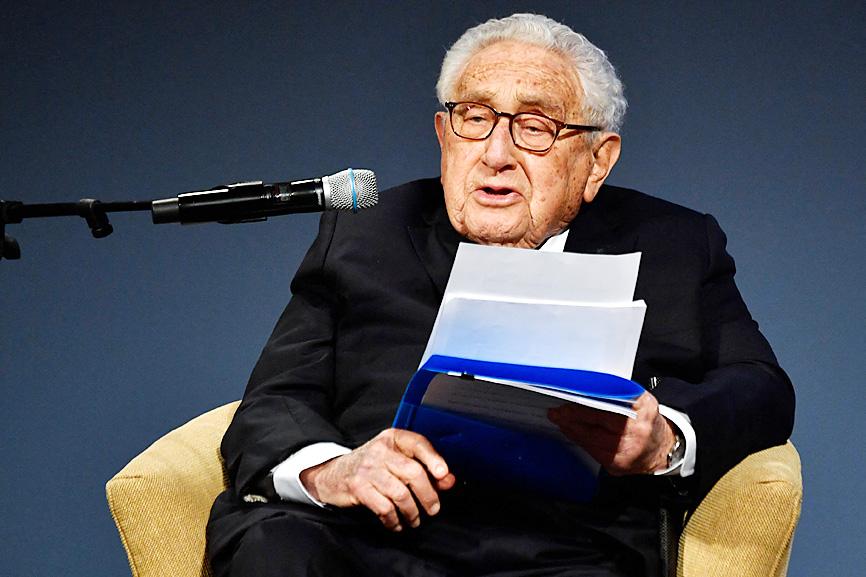Former US secretary of state Henry Kissinger on Friday said that US-China tensions threaten to engulf the entire world and could lead to an Armageddon-like clash between the two military and technology giants.
The 97-year-old, who as an adviser to then-US president Richard Nixon crafted the 1971 unfreezing of relations between Washington and Beijing, said the mix of economic, military and technological strengths of the two superpowers carries more risks than the Cold War with the Soviet Union.
Strains with China are “the biggest problem for America, the biggest problem for the world,” Kissinger told the McCain Institute’s annual Sedona Forum on global issues.

Photo: AFP
“If we can’t solve that, then the risk is that all over the world a kind of cold war will develop between China and the United States,” Kissinger said.
While nuclear weapons were large enough to damage the entire globe during the Cold War, he said advances in nuclear technology and artificial intelligence — where China and the US are both leaders — have multiplied the doomsday threat.
“For the first time in human history, humanity has the capacity to extinguish itself in a finite period of time,” Kissinger said. “We have developed the technology of a power that is beyond what anybody imagined even 70 years ago.”
“And now, to the nuclear issue is added the high-tech issue, which in the field of artificial intelligence, in its essence is based on the fact that man becomes a partner of machines and that machines can develop their own judgement,” he said. “So in a military conflict between high-tech powers, it’s of colossal significance.”
The Cold War between the US and the Soviet Union during the decades after World War II was more one-dimensional, focused on nuclear weapons competition, said Kissinger, one of the leading strategic thinkers of the past six decades.
“The Soviet Union had no economic capacity. They had military technological capacity,” he said. They “didn’t have developmental technological capacity as China does. China is a huge economic power in addition to being a significant military power.”
Kissinger said US policy toward China must take a two-pronged approach: standing firm on US principles to demand China’s respect, while maintaining a constant dialogue and finding areas of cooperation.
“I’m not saying that diplomacy will always lead to beneficial results,” he said. “This is the complex task we have... Nobody has succeeded in doing it completely.”

‘CORRECT IDENTIFICATION’: Beginning in May, Taiwanese married to Japanese can register their home country as Taiwan in their spouse’s family record, ‘Nikkei Asia’ said The government yesterday thanked Japan for revising rules that would allow Taiwanese nationals married to Japanese citizens to list their home country as “Taiwan” in the official family record database. At present, Taiwanese have to select “China.” Minister of Foreign Affairs Lin Chia-lung (林佳龍) said the new rule, set to be implemented in May, would now “correctly” identify Taiwanese in Japan and help protect their rights, the Ministry of Foreign Affairs said in a statement. The statement was released after Nikkei Asia reported the new policy earlier yesterday. The name and nationality of a non-Japanese person marrying a Japanese national is added to the

AT RISK: The council reiterated that people should seriously consider the necessity of visiting China, after Beijing passed 22 guidelines to punish ‘die-hard’ separatists The Mainland Affairs Council (MAC) has since Jan. 1 last year received 65 petitions regarding Taiwanese who were interrogated or detained in China, MAC Minister Chiu Chui-cheng (邱垂正) said yesterday. Fifty-two either went missing or had their personal freedoms restricted, with some put in criminal detention, while 13 were interrogated and temporarily detained, he said in a radio interview. On June 21 last year, China announced 22 guidelines to punish “die-hard Taiwanese independence separatists,” allowing Chinese courts to try people in absentia. The guidelines are uncivilized and inhumane, allowing Beijing to seize assets and issue the death penalty, with no regard for potential

‘UNITED FRONT’ FRONTS: Barring contact with Huaqiao and Jinan universities is needed to stop China targeting Taiwanese students, the education minister said Taiwan has blacklisted two Chinese universities from conducting academic exchange programs in the nation after reports that the institutes are arms of Beijing’s United Front Work Department, Minister of Education Cheng Ying-yao (鄭英耀) said in an exclusive interview with the Chinese-language Liberty Times (the Taipei Times’ sister paper) published yesterday. China’s Huaqiao University in Xiamen and Quanzhou, as well as Jinan University in Guangzhou, which have 600 and 1,500 Taiwanese on their rolls respectively, are under direct control of the Chinese government’s political warfare branch, Cheng said, citing reports by national security officials. A comprehensive ban on Taiwanese institutions collaborating or

STILL COMMITTED: The US opposes any forced change to the ‘status quo’ in the Strait, but also does not seek conflict, US Secretary of State Marco Rubio said US President Donald Trump’s administration released US$5.3 billion in previously frozen foreign aid, including US$870 million in security exemptions for programs in Taiwan, a list of exemptions reviewed by Reuters showed. Trump ordered a 90-day pause on foreign aid shortly after taking office on Jan. 20, halting funding for everything from programs that fight starvation and deadly diseases to providing shelters for millions of displaced people across the globe. US Secretary of State Marco Rubio, who has said that all foreign assistance must align with Trump’s “America First” priorities, issued waivers late last month on military aid to Israel and Egypt, the